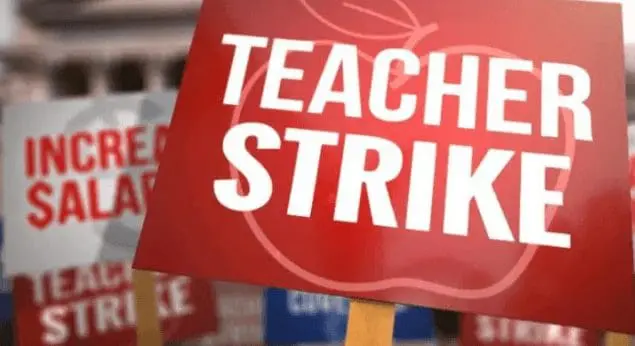By Ghana News
Copyright ghanamma

The Teachers and Educational Workers’ Union (TEWU) of the Trades Union Congress (TUC), Ghana, has launched a fierce attack on breakaway unions, accusing them of deliberately creating confusion among university workers during the ongoing nationwide strike.
General Secretary King James Azortibah condemned a joint statement by the Tertiary Education Workers Union of Ghana (TEWU-GH) and the Technical University Workers Association of Ghana (TUWAG), describing it as a calculated attempt to undermine legitimate industrial action.
TEWU of TUC declared the indefinite nationwide strike effective September 19, 2025, covering staff in public universities, technical universities, the Ghana Education Service, and the Ghana Library Board. The action affects non-teaching staff across Ghana’s educational sector who are demanding better working conditions and salary adjustments.
Azortibah dismissed the splinter groups as having “no legal mandate, no bargaining certificate, and no moral authority” to represent university workers. He emphasized that TEWU of TUC remains the only legally recognized union for junior staff in public and technical universities, a status it has held for over 65 years.
The confrontation highlights deep divisions within Ghana’s educational worker unions. The split occurred approximately three years ago when former TEWU of TUC executives who had completed their two-term limits formed the breakaway TEWU-GH, seeking to continue their leadership roles.
TEWU-GH and TUWAG have consistently distanced themselves from strike actions, directing their members to remain at work and clarifying they are not involved in industrial actions. This stance directly conflicts with TEWU of TUC’s call for total participation in the current strike.
The official union pointed to its exclusive recognition by key government bodies, including the Labour Act 2003 and the National Labour Commission. Azortibah stressed that only TEWU of TUC has signed Rules of Engagement with the Fair Wages and Salaries Commission, giving it sole bargaining authority.
The current strike protests what TEWU describes as years of unfair labour practices, neglect, and discrimination against non-teaching staff. The union blames government inaction for the collapse of industrial peace in the education sector.
Regional chapters, including the Volta Regional Secretariat, have joined the nationwide action, emphasizing that non-teaching staff deserve recognition and should not be taken for granted.
The dispute over union legitimacy complicates resolution efforts as government negotiators face uncertainty about which groups represent workers. The strike threatens to disrupt the academic calendar over stalled conditions of service, delayed promotions, and pay disparities.
Azortibah warned workers against following advice from what he termed “illegitimate groups,” arguing that only TEWU of TUC can protect their salaries, working conditions, and future rights. He characterized the breakaway unions as “opportunists” attempting to sabotage collective worker struggles.
The union leader called for unity among junior staff, urging complete participation in the strike while rejecting statements from TEWU-GH, TUWAG, and other splinter groups. He framed the industrial action as essential for worker welfare, dignity, and future security.
This institutional conflict reflects broader challenges in Ghana’s labor relations, where competing unions claim legitimacy while workers face uncertainty about representation. The situation may require intervention from the National Labour Commission to clarify bargaining rights and authority.
The ongoing strike has already forced some universities to postpone academic activities, with the University of Ghana among institutions affected by the industrial action. Resolution depends partly on clarifying which unions have legitimate authority to negotiate on behalf of educational workers.
As the strike continues, the battle between TEWU of TUC and its breakaway rivals represents more than organizational politics. It highlights fundamental questions about worker representation, union legitimacy, and the effectiveness of Ghana’s industrial relations framework in resolving complex labor disputes.